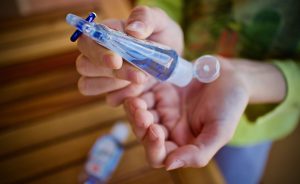As I have started venturing out to run errands, I’ve noticed something: hand sanitizers are the new “popular.”
I have seen these sanitizers offered in various scents, and even flavored as chocolate and raspberry. I have also seen them packaged as water bottles, juice bottles and even beer cans. This is cause for some concern for everyone, but especially if you have children and pets.
So, here is a rule to remember: Hand sanitizers should be used ONLY if soap and water are not available.
Nothing replaces good handwashing. For years, the federal Centers for Disease Control and Prevention (CDC) has cautioned that a major tool to protect against disease spread is for us to wash our hands with warm soap and water for at least 20 seconds. Wash after using the restroom. Wash before food preparation. Wash before eating. And wash after coughing, sneezing or anything else that might (and often does) contaminate our hands.
 Hand sanitizers do have their place, of course, when chosen and used properly.
Hand sanitizers do have their place, of course, when chosen and used properly.
Make sure the hand sanitizer you are purchasing contains at least 60 percent alcohol. But, be aware of hand sanitizer products that contain methanol (wood alcohol), a toxin. The U.S. Food and Drug Administration (FDA) has issued warnings about methanol-containing sanitizers, noting the toxin can be absorbed through skin and cause damage.
Hand sanitizer works best when you rub it all over your hands, including between your fingers. Let the sanitizer do its job, and don’t wipe your hands dry. Rather, let them air dry. And, if your hands are greasy or visibly dirty, skip the sanitizer and grab the soap; you need to wash your hands.
Also, follow some basic safety guidelines for hand sanitizers.
The FDA regulates hand sanitizers, considering them to be over-the-counter, non-prescription drugs. As you would with other drugs, store hand sanitizer out of the reach of children and even pets. With all the new scents, flavors and packaging, hand sanitizers can be attractive to young children and pets. Even adults can make the mistake of consuming a hand sanitizer from a package that resembles a water bottle.
Because hand sanitizer contains alcohol, drinking even a small amount can cause alcohol poisoning, according to the FDA. If you or your child has swallowed hand sanitizer, immediately contact your poison control center. If you discover that your pet has ingested hand sanitizer, call your veterinarian or a pet poison control center right away.
Note that the FDA draws a distinction between direct ingestion and possibly consuming trace amounts left on skin after use, stating “there is no need to be concerned if your children eat with or lick their hands after using hand sanitizer.”
At the end of the day, hand sanitizers are a good, convenient substitute when soap and water are not available. Just be diligent. And don’t ditch the soap completely.
 0
0
